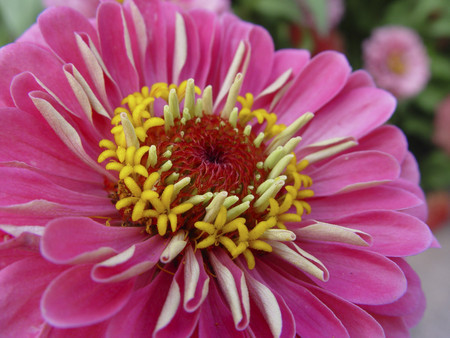Get picky

“Let’s not pick that scab,” my mother used to say when I would rehash some former conflict. But as a gardener, it’s OK to get picky. So get out your clippers, sharpen your fingernails or devote a stout pair of scissors to the task. Whether you grow flowers or a kitchen garden, this is the season to pinch and pick and pluck to your heart’s content. In fact, this is the accomplished gardener’s secret of success.
During the long days of summer, plants are peaking. They have slowed their vegetative process to devote all their energy to flowering. This brings the garden to its most active time, when birds and butterflies come in droves to pollinate the blossoms. Pollination is essential if fruit is to form, which is the goal with your squash, but flowers are another story.
All your flowers want to do is make seeds. Their whole reason for living is to produce enough seed to guarantee their species survives next year. It’s simple for them in the wild with just this one aim. But we bring them into the garden and ask for a lot more work. We want them to flower and flower and flower.
Your goal as a gardener is to interrupt this aim of the plant to set seed because seed formation releases hormones that tell it the job is done. Seed says, “Stop flowering now and help me mature.” But if you cut off spent flowers before they can start to make seed, no hormone message is sent. You put that plant in suspended animation where it stays in its flowering phase indefinitely. This is why great gardeners have flower gardens that go bonkers in midsummer, because they’re out there every day picking and plucking away the spent flowers.
With vegetables, it works a bit differently because you want the flowers to be pollinated so they form fruit, which is the precursor to seed formation. A young squash is delicious because the seeds inside haven’t formed. The older the squash the bigger and more fibrous the seedy center becomes. Therefore, go out and pick and pluck your peppers, squash and tomatoes every day. Don’t allow them to become overripe. Over-ripeness is the seeds forming inside the fruit once again. And this makes your plants quit flowering.
There’s another benefit to daily picking and pinching. It does more than just get you out there in the garden. You’re looking at flowers and fruits carefully to assess their maturity. When you have a purpose like this, you’ll see the plants in much greater detail. Not only will this observance teach you loads about how they grow, you’ll also spot problems the moment they appear.
Pests and disease of any kind are much easier to control if you catch them early on. A few hornworms on the tomatoes are far more controllable than a gang of them. When the problem is small you may be able to solve it by simply handpicking the worms as you work the flowers and fruit. Or perhaps you notice the plants are growing dusty and need to be sprayed off, which helps control spider mites.
Detailed observation also helps you know how your plants look when they’re happy. Again, like a human being, spending time together helps you get to know one another better. Then when that person or plant is a bit wilted, you spot it immediately.
So go ahead and get picky, every day! Cut the flowers when they fade or do so early to enjoy an indoor bouquet. Observe your plants closely. Harvest the fruit promptly. And become a super gardener one flower at a time.
Maureen Gilmer is a horticulturist. Her blog, the MoZone, offers ideas for cash-strapped families. Read the blog at www.MoPlants.com/blog. E-mail her at mogilmer@yahoo.com. Also, join her online for the Garden Party social networking at Learn2grow.com.












